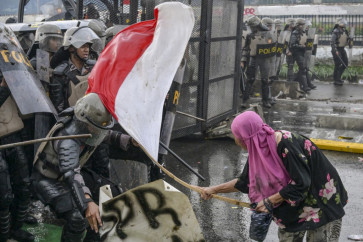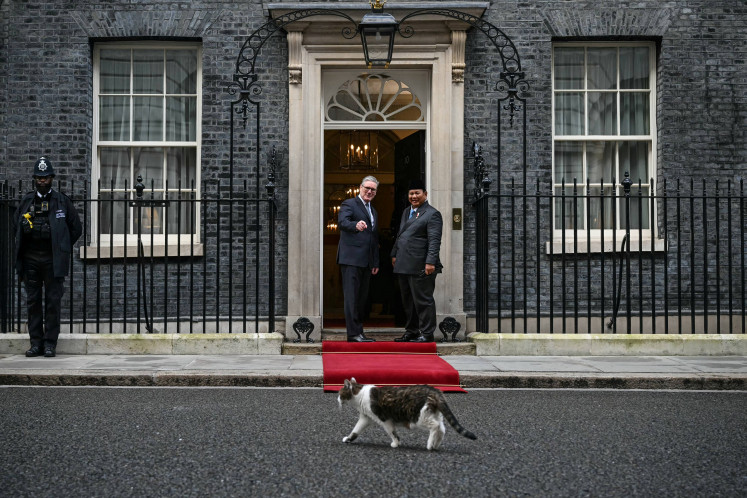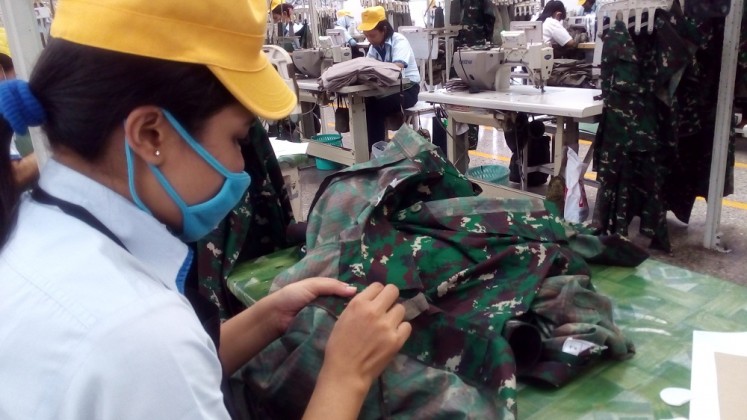Popular Reads
Top Results
Can't find what you're looking for?
View all search resultsPopular Reads
Top Results
Can't find what you're looking for?
View all search resultsUnresolved violence, discrimination put RI’s tolerance in question
Religious conflicts and nationwide violence continue to taint the state of tolerance in the world’s most populous Muslim-majority nation, with the recent blasphemy allegation lodged against Jakarta Governor Basuki “Ahok” Tjahaja Purnama and a church attack in Samarinda, East Kalimantan exposing the challenges faced by law enforcement when dealing with religious-motivated crimes, activists have said
Change text size
Gift Premium Articles
to Anyone
R
eligious conflicts and nationwide violence continue to taint the state of tolerance in the world’s most populous Muslim-majority nation, with the recent blasphemy allegation lodged against Jakarta Governor Basuki “Ahok” Tjahaja Purnama and a church attack in Samarinda, East Kalimantan exposing the challenges faced by law enforcement when dealing with religious-motivated crimes, activists have said.
Speaking at a discussion to mark International Tolerance Day, which falls on Nov. 16, Setara Institute research director Ismail Hasani said the trend of conservatism among societies had continued to rise and contributed the most to religious-based violence and tension.
With its leniency in enforcing the law without exception while being persistent in maintaining regulations considered discriminatory toward minority religious groups, the government has also given room for conservatism to grow, Ismail said.
“Conservatism has also dominated the government’s decision-making process and has influenced many issues, as it has also been used to gain political support. Also, political aspirations tainted with intolerance are [often accepted] in Indonesia,” Ismail said on Tuesday.
“Blasphemy tends to be used by actors with a political agenda. They are in fact not being hurt by the alleged action of blasphemy itself,” Ismail said.
People demonstrated recently against Ahok, a Christian, accusing him of blasphemy after he made a statement referring to al-Maidah 51, a verse in the Quran.
Critics have long-called for the government to scrap the 1965 Blasphemy Law and its association in the Criminal Code (KUHP) since the regulations have repeatedly been used by hard-liners to launch attacks against religious minority groups. Members of Ahmadiyah and Shia communities have faced repeated attacks by Sunni Muslims who condemn them for their beliefs. Numerous Protestant and Catholic groups have also faced obstacles.
Human Rights Working Group (HRWG) special adviser Choirul Anam said the government should protect people’s right to adhere to their beliefs.
“What [the government] should forbid is intolerant actions,” he said.
“If our law is still based on ‘feelings’ there will be no justice served. There is no legal certainty [for minorities],” he added.
The Oikumene Church in Sengkotek subdistrict, Samarinda, was attacked by a man who threw several Molotov cocktails into the parking lot during Sunday morning service.
A similar incident occurred a day after, in which two unidentified men threw Molotov cocktails at Budi Dharma Vihara in Singkawang, West Kalimantan.
Nahdlatul Ulama’s (NU) Institute for Research and Human Resources Development (Lakpesdam) chairman Rumadi Ahmad said the country was becoming less tolerant, which in turn had increased the potential for blasphemy allegations to be lodged by intolerant groups against minorities voicing their opinions.
“People are becoming less wise. They are more childish, easily offended and quick to become angry. Something that we used to tolerate is now considered blasphemy,” Rumadi told The Jakarta Post.
Indonesia has seen an increase of violations against religious freedom in the country. The Wahid Institute recorded 190 violations against religious freedom in 2015, a 23 percent increase from 154 in 2014.
The violations are mostly in the form of sealing places of worship and the prohibition of their construction, as well as obstructing celebrations or rituals of certain faiths.
Blasphemy is not acknowledged since International Covenant of Civil and Political Rights has asserted that freedom of religion and belief are protected at any cost, Imparsial director Al-Araf said.
“Every country should protect its people’s right to religious freedom. Discourse over blasphemy is about perspective and the beliefs of citizens, and it should not be ruled under law,” Al-Araf said, adding that the government should immediately repeal laws that discriminate against certain religious groups.
What the government should be concerned about is the circulation of hate speech, which is a threat to democracy since it could spark hatred and lead to radicalism and terrorism in the country, Al-Araf said.










